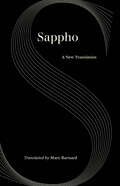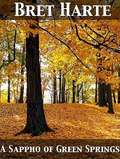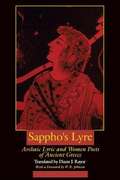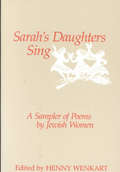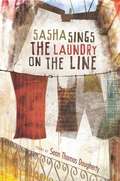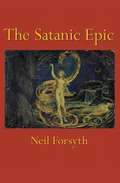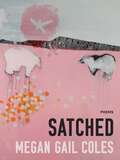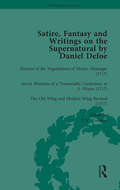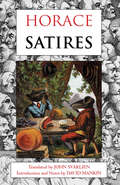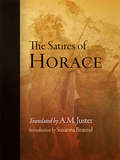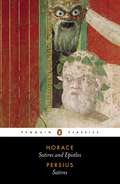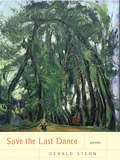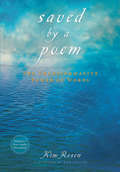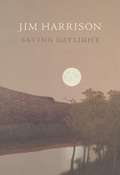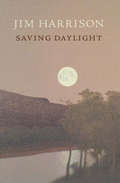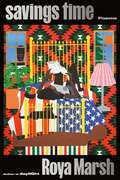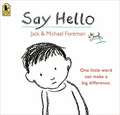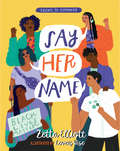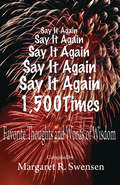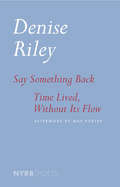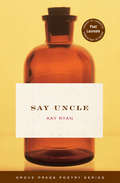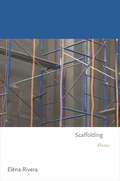- Table View
- List View
Sappho: A New Translation
by SapphoThese hundred poems and fragments constitute virtually all of Sappho that survives and effectively bring to life the woman whom the Greeks consider to be their greatest lyric poet. Mary Barnard's translations are lean, incisive, direct—the best ever published. She has rendered the beloved poet's verses, long the bane of translators, more authentically than anyone else in English.
Sappho's Lyre: Archaic Lyric and Women Poets of Ancient Greece
by Diane RayorSappho sang her poetry to the accompaniment of the lyre on the Greek island of Lesbos over 2500 years ago. Throughout the Greek world, her contemporaries composed lyric poetry full of passion, and in the centuries that followed the golden age of archaic lyric, new forms of poetry emerged. In this unique anthology, today's reader can enjoy the works of seventeen poets, including a selection of archaic lyric and the complete surviving works of the ancient Greek women poets--the latter appearing together in one volume for the first time. Sappho's Lyre is a combination of diligent research and poetic artistry. The translations are based on the most recent discoveries of papyri (including "new" Archilochos and Stesichoros) and the latest editions and scholarship. The introduction and notes provide historical and literary contexts that make this ancient poetry more accessible to modern readers. Although this book is primarily aimed at the reader who does not know Greek, it would be a splendid supplement to a Greek language course. It will also have wide appeal for readers of' ancient literature, women's studies, mythology, and lovers of poetry.
Sarah's Daughters Sing: A Sampler of Poems by Jewish Women
by Henny WenkartSarah's Daughters Sing: A Sampler of Poems by Jewish Women is prepared by the Poetry Project of the Jewish Women's Resource Center, A project of National Council of Jewish Women, New York Section.
Saraswati Antati & Satakopar Antati of Kambar
by KambarAndhathi is a classical poetic format of verses wherein the last word of a verse will be the first word of the next verse and so on till the end of all verses. Saraswati Andhathi belongs to this format wherein Poet Kambar is profusely glorifying Goddess Saraswati with whose boon Kambar was believed to have been bestowed with poetic skill. In Satagopopar Andhati Kambar pays rich tributes to Saint Nammazhwar, one of the twelve vaishnavite Azhwars. Poet Kambar lauds God Vishnu as the greatest of all Gods and Nammazhwar who composed chanting verses on God Vishnu as the greatest of all Azhwars.
Sasha Sings the Laundry on the Line (American Poets Continuum #125)
by Sean Thomas Dougherty"These soul-infused, deftly crafted stanzas pulse with the rhythms of a poet who lives his life out loud. Sean Thomas Dougherty has always shunned convention in favor of his fresher landscapes-and this book will be the one that stamps his defiant signature on the canon."-Patricia SmithSasha Sings the Laundry on the Line is a powerful, grief-driven, deeply felt collection that finds the beautiful and the true, the little epiphanies that give our lives meaning no matter how ephemeral they might be.The author of ten previous poetry collections, Sean Thomas Dougherty teaches poetry at Case Western University and lives in Erie, Pennsylvania, and Cleveland, Ohio.
Sasha Sings the Laundry on the Line
by Sean Thomas Dougherty"These soul-infused, deftly crafted stanzas pulse with the rhythms of a poet who lives his life out loud. Sean Thomas Dougherty has always shunned convention in favor of his fresher landscapes-and this book will be the one that stamps his defiant signature on the canon."-Patricia SmithSasha Sings the Laundry on the Line is a powerful, grief-driven, deeply felt collection that finds the beautiful and the true, the little epiphanies that give our lives meaning no matter how ephemeral they might be.The author of ten previous poetry collections, Sean Thomas Dougherty teaches poetry at Case Western University and lives in Erie, Pennsylvania, and Cleveland, Ohio.
The Satanic Epic
by Neil ForsythThe Satan of Paradise Lost has fascinated generations of readers. This book attempts to explain how and why Milton's Satan is so seductive. It reasserts the importance of Satan against those who would minimize the poem's sympathy for the devil and thereby make Milton orthodox.
Satched
by Megan Gail ColesNamed after a local word meaning “soaked through” or “weighed down,” Scotiabank Giller Prize finalist Megan Gail Coles’s debut poetry collection, Satched, is a vivid portrait of intergenerational trauma, ecological grief, and late-stage capitalism from the perspective of a woman of rural-remote, Northern, working class, mixed ancestry. Honest, penetrating, and often darkly comic, these poems explore the extraordinary will it requires to stay alive in the face of economic precariousness, growing inequality, and prevailing dissatisfaction. With a fierce dedication to place, the collection explores the conflict inherent to individualistic priorities and collective needs present in a hyper-commodified Newfoundland and Labrador. Satched demands compassionate advocacy for all as it resolutely strives for clarity and acceptance while celebrating the momentary glimpses of joy in the path toward shared values and resilience.
Satire, Fantasy and Writings on the Supernatural by Daniel Defoe, Part I Vol 4
by W R Owens P N Furbank David Blewett Peter Elmer John Mullan Geoffrey Sill G A StarrThe publication of the 44-volume Works of Daniel Defoe continues with this collection of Defoe's satirical poetry and fantasy writings, and writings on the supernatural.
Satires
by John Svarlien Horace David MankinThe Satires of Horace offer a hodgepodge of genres and styles: philosophy and bawdry; fantastic tales and novelistic vignettes; portraits of the poet, his contemporaries, and his predecessors; jibes, dialogue, travelogue, rants, and recipes; and poetic effects in a variety of modes. For all their apparent lightheartedness, however, the poems both illuminate and bear the marks of a momentous event in world history, one in which Horace himself played an active role--the death of the Roman Republic and the birth of the Principate.John Svarlien's lively blank-verse translation reflects the wide range of styles and tones deployed throughout Horace's eighteen sermons or conversations, deftly reproducing their distinctive humor while tracking the poet's changing mannerisms and moods.David Mankin's Introduction offers a brief account of the political upheavals in which Horace participated as well as the social setting in which his Satires were produced, and points up hallmarks of the poet's distinctive brand of satire. His detailed commentary offers a behind-the-scenes look at Roman society and an often between-the-lines examination of a key work of one of Rome's sharpest observers.
The Satires of Horace
by A. M. Juster Susanna BraundThe Roman philosopher and dramatic critic Quintus Horatius Flaccus (65-3 B.C.), known in English as Horace, was also the most famous lyric poet of his age. Written in the troubled decade ending with the establishment of Augustus's regime, his Satires provide trenchant social commentary on men's perennial enslavement to money, power, fame, and sex. Not as frequently translated as his Odes, in recent decades the Satires have been rendered into prose or bland verse.Horace continues to influence modern lyric poetry, and our greatest poets continue to translate and marvel at his command of formal style, his economy of expression, his variety, and his mature humanism. Horace's comic genius has also had a profound influence on the Western literary tradition through such authors as Swift, Pope, and Boileau, but interest in the Satires has dwindled due to the difficulty of capturing Horace's wit and formality with the techniques of contemporary free verse.A. M. Juster's striking new translation relies on the tools and spirit of the English light verse tradition while taking care to render the original text as accurately as possible.
The Satires of Horace and Persius
by Horace PersiusThe Satires of Horace (65-8 BC), written in the troubled decade ending with the establishment of Augustus' regime, provide an amusing treatment of men's perennial enslavement to money, power, glory and sex. Epistles I, addressed to the poet's friends, deals with the problem of achieving contentment amid the complexities of urban life, while Epistles II and the Ars Poetica discuss Latin poetry - its history and social functions, and the craft required for its success. Both works have had a powerful influence on later Western literature, inspiring poets from Ben Jonson and Alexander Pope to W. H. Auden and Robert Frost. The Satires of Persius (AD 34-62) are highly idiosyncratic, containing a courageous attack on the poetry and morals of his wealthy contemporaries - even the ruling emperor, Nero.
Save the Last Dance: Poems
by Gerald SternThe fifteenth collection by a celebrated poet whose "terrific, boisterous energy has never flagged" (Megan Harlan, San Francisco Chronicle). In Save the Last Dance, Gerald Stern gives us a stunning collection of his intimately personal--yet always universal, and always surprising--poems, rich with humor and insight. Shorter lyric poems in the first two parts continue the satirical and often redemptive vision of his last collection, Everything Is Burning, while never failing to carve out new emotional territory. In the third part, a long poem called "The Preacher," Stern takes the book of Ecclesiastes as a starting point for a meditation on loss, futility, and emptiness, represented here by the concept of a "hole" that resurfaces throughout.
Saved by a Poem: The Transformative Power Of Poetry
by Kim RosenCan someone really be saved by a poem? In Kim Rosen’s book, the answer is a resounding "Yes!" Poetry, the most ancient form of prayer, is a necessary medicine for our times: a companion through difficulty; a guide when we are lost; a salve when we are wounded; and a conduit to an inner source of joy, freedom, and insight. <P><P>Whether you are a lover of poetry or have yet to discover its power, Rosen offers a new way to experience a poem. She encourages you to feel the poem as you might an affirmation or sacred text, which can align every level of your being. <P><P>In an uncertain world, Saved by a Poem is an emphatic call to cultivate the ever-renewable resources of the heart. Through poetry, the unspeakable can be spoken, the unendurable endured, and the miraculous shared. <P><P>Weaving teaching, story, verse, and memoir, Rosen guides you to find a poem that speaks to you so you can take it into your life and become a voice for its wisdom in the world.Inspirational audio download included! <P><P>Featuring the voices of well-known authors reading a favorite poem and discussing its personal significance: Joan Borysenko, Andrew Harvey, Jane Hirshfield, Marie Howe, Grace Yi-Nan Howe, Robert Holden, Stanley Kunitz, Elizabeth Lesser, Thomas Moore, Christiane Northrup, Cheryl Richardson, Kim Rosen, and Geneen Roth.
Saving Daylight
by Jim HarrisonFrom the back cover: Jim Harrison is one of America's most versatile and celebrated writers, and his work as a poet has earned him recognition as an "untrammeled renegade genius." Saving Daylight is Harrison's tenth book of poems, and his first full-length poetry collection in a decade. Honored as a Poetry Book of the Year by Library Journal Kansas City Star "100 Noteworthy Books of the Year" list. Honored as a Michigan Book of the Year. About the Author Jim Harrison is a poet and novelist dividing his year between Montana and the Mexican border.
Saving Daylight
by Jim HarrisonNamed to the Notable Books of the Year lists from The Kansas City Star and the Michigan Library Association."Jim Harrison is a writer with immortality in him."--The Times (London)"This is [Harrison's] most robust, sure-footed, and blood-raising poetry collection to date."--BooklistJim Harrison--one of America's most beloved writers--calls his poetry "the true bones of my life." Although he is best known as a fiction writer, it is as a poet that Publishers Weekly famously called him an "untrammeled renegade genius." Saving Daylight, Harrison's tenth collection of poetry, is his first book of new poems in a decade. All of Harrison's abundant passions for life are poured into suites, prose poems, letter-poems, and even lyrics for a mariachi band.The subjects and concerns are wide-ranging--from the heart-rending "Livingston Suite," where a boy drowns in the local river and the body is discovered by the poet's wife--to some of the most harrowing political poems of Harrison's career. There is also a cast of creature characters--bears, dogs, birds, fish--as well as the woodlands, thickets, and occasional cities of Arizona, Montana, Michigan, France, and Mexico."Imagination is my only possession," Harrison once said. And Saving Daylight is an imagination in full, exuberant bloom. Jim Harrison is the author of over thirty books of poetry, fiction, and nonfiction. His work has been translated into dozens of languages. Born and raised in Michigan, he now lives in Montana and Arizona.
savings time: Poems
by Roya MarshThe Bronx born activist and poet Roya Marsh returns with a riveting exploration of Black joy, collective action, and healing. what will come of what you leave behind?do youremember that timeyou survived?The poems in Roya Marsh’s second collection, savings time, wear their raw feeling and revolutionary forcefulness on their sleeves. Alternating between confrontation and celebration, Marsh trains her unsparing eye on the twinned subjects of Black rage and Black healing with practiced, musical intention.In poems flitting between breathless prose and measured lyricism, Marsh contemplates the contradictions and challenges of Black life in America, tackling everything from police brutality and urban gentrification to queer identity, presidential elections, and pop culture, all while calling for a world where self-care, especially for Black women, is not just encouraged but mandated. “no one told the Black girl,” she writes, “‘see you later’ was a prayer / begging us survive our own erasure.”As unforgettable on the page as when recited in Marsh’s legendary spoken-word performances, the poems in savings time are focused on both revolution and self-love, at once holding society accountable for its exploitation of Black life and honoring the joy of persisting nonetheless.
Say Hello (Fountas & Pinnell LLI Blue: Level G #Level G)
by Jack Foreman Michael ForemanA lone dog comes upon a group of kids playing ball and with leaping ease, joins the game. They’re all having so much fun, they don’t see a sad little boy standing off by himself. Who will spy the boy and invite him to play? With arresting images by a master illustrator and a simple, touching text by his son, SAY HELLO evokes the joy and relief of finding a new friend just when it’s needed the most.
Say Her Name
by Zetta ElliottInspired by the #SayHerName campaign launched by the African American Policy Forum, these poems pay tribute to victims of police brutality as well as the activists insisting that Black Lives Matter. Elliott engages poets from the past two centuries to create a chorus of voices celebrating the creativity, resilience, and courage of Black women and girls.This collection features forty-nine powerful poems, four of which are tribute poems inspired by the works of Lucille Clifton, Audre Lorde, Nikki Giovanni, and Phillis Wheatley. This provocative collection will move every reader to reflect, respond-and act.
Say It Again 1,500 Times: Favorite Thoughts and Words of Wisdom
by Margaret SwensenMargaret Swensen loved to be outdoors, but she was not a hiker or an angler; she was first a mother and a quilter, but at 55 years old she did all the research, even hiked many of the trails, and wrote the Hiker's Guide to Alaska; and did all the research and wrote most of the Angler's Guide to Alaska. She compiled and published the poems of her grandfather, Willis Eugene Robison, in the book As Life Passes. Margaret loved words and she loved writing. Say It Again, 1,500 Times is the compilation of the expressions that governed her life. It's the stuff she used to train her children, teach classes, and incorporated in life's tales she enjoyed tellin--and others enjoyed hearing. Say It Again, 1,500 Times is truly Margaret's favorite thought and words of wisdom.
Say Something Back & Time Lived, Without Its Flow
by Denise RileyA moving meditation on grief and motherhood by one of Britain's most celebrated poets.Say Something Back will allow readers to see just why Denise Riley has been held in such high regard by her fellow poets for so long. The book reproduces A Part Song, a profoundly moving document of grieving and loss, and one of the most widely admired long poems of recent years. Elsewhere these poems become a space for contemplation of the natural world and of physical law, and for considering what it is to invoke those who are absent. But finally, they extend our sense of what the act of human speech can mean—and especially what is drawn forth from us when we address our dead. Lyric, intimate, acidly witty, unflinchingly brave, Say Something Back—which also includes a powerful new prose meditation about grief and its aftermath, &“Time Lived, Without Its Flow&”—is a deeply moving book by one of our finest poets, and one destined to introduce Riley&’s name to a wide new readership.
Say Uncle (Grove Press Poetry Series)
by Kay Ryan&“A poetry collection that marries wit and wisdom more brilliantly than any I know&” by the Pulitzer Prize–winning former US Poet Laureate (Jane Hirshfield, author of Come, Thief). Filled with wry logic and a magical, unpredictable musicality, Kay Ryan&’s poems continue to generate excitement with their frequent appearances in The New Yorker and other leading periodicals. Say Uncle, Ryan&’s fifth collection, is filled with the same hidden connections, the same slyness and almost gleeful detachment that has delighted readers of her earlier books. Compact, searching, and oddly beautiful, these poems, in the words of internationally acclaimed poet and writer Dana Gioia, &“take the shape of an idea clarifying itself.&” &“The first thing you notice about her poems is an elbow-to-the-ribs playfulness.&” —San Francisco Chronicle &“The short lines and quick images—almost snapshots—are elemental. Ryan puts them together, then pulls them apart, and twists them in playful fashion, as though she were an alchemist with a modern experimental attitude . . . Truly short-line, one-stanza (for the most part) wonders: full-brained poems in a largely half-brained world.&” —Kirkus Reviews &“Witty, charming, serious and delightful . . . her tight structures, odd rhymes and ethical judgments place her more firmly in the tradition of Marianne Moore and, latterly, Amy Clampitt. Those poets, though, wrote many kinds of poems: Ryan, in this volume, writes just one kind. It is, however, a kind worth looking out for—well crafted, understated, funny and smart.&” —Publishers Weekly
Scaffolding: Poems
by Eléna RiveraScaffolding is a sequence of eighty-two sonnets written over the course of a year, dated and arranged in roughly chronological order, and vividly reflecting life in New York City. In this, her third book of poetry, Eléna Rivera uses the English sonnet as a scaffold to explore daily events, observations, conversations, thoughts, words, and memories--and to reflect on the work of earlier poets and the relationship between life and literature.Guided by formal and syllabic constraints, the poems become in part an exploration of how form affects content and how other poets have approached the sonnet. The poems, which are very attentive to rhythm and sound, are often in conversation with historical, philosophical, artistic, and literary sources. But at the same time they engage directly with the present moment. Like the construction scaffolding that year after year goes up around buildings all over New York, these poems build on one another and change the way we see what was there before.
